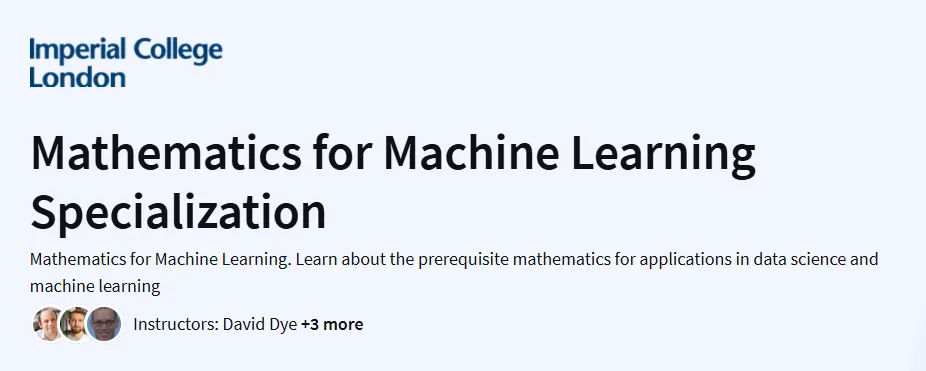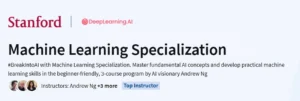What you will learn in Mathematics for Machine Learning Specialization Course
- Gain a deep understanding of linear algebra, including vectors, matrices, and transformations.
- Learn multivariable calculus concepts essential for optimization in machine learning.
- Explore probability and statistics to analyze data and make informed decisions.
- Develop skills in mathematical modeling for real-world AI and machine learning applications.
- Apply mathematical techniques to practical machine learning problems.
- Work on hands-on exercises and projects to solidify learning.
Program Overview
Linear Algebra for Machine Learning
⏱️ 4-6 weeks
- Understand vectors, matrices, and operations used in ML.
- Learn about eigenvalues, eigenvectors, and their applications.
- Explore transformations and their impact on machine learning algorithms.
Multivariable Calculus for Machine Learning
⏱️6-8 weeks
- Learn differentiation and gradient-based optimization.
- Explore partial derivatives and their role in neural networks.
- Understand backpropagation in deep learning models.
Probability and Statistics for Machine Learning
⏱️6-10 weeks
- Learn probability distributions, Bayes’ theorem, and statistical inference.
- Understand hypothesis testing and confidence intervals for data-driven decision-making.
- Explore Markov Chains and their applications in machine learning.
Capstone Project: Applying Mathematics to Machine Learning
⏱️8-12 weeks
- Work on real-world applications integrating linear algebra, calculus, and probability.
- Apply mathematical techniques to optimize ML models.
- Gain practical experience through case studies and coding exercises.
Get certificate
Job Outlook
- High Demand for ML Engineers: Companies seek professionals with a strong mathematical foundation for AI and ML development.
- Competitive Salaries: Machine learning engineers earn $100,000 – $150,000+, with higher pay for expertise in mathematics-driven AI.
- Versatile Applications: Math skills are crucial for AI, finance, robotics, and data science roles.
- Industry Recognition: A strong math background is essential for advanced AI and deep learning careers.
- Career Pathways: Ideal for roles in machine learning, AI research, quantitative analysis, and data science.
Explore More Learning Paths
Enhance your machine learning foundation and mathematical expertise with these carefully curated programs designed to strengthen your analytical skills and accelerate your AI career.
Related Courses
Mathematics for Machine Learning: Multivariate Calculus – Deepen your understanding of calculus and its applications in machine learning algorithms.
Mathematics for Machine Learning and Data Science Specialization Course – Gain a comprehensive foundation in the key mathematical concepts driving modern data science and ML.
Applied Machine Learning in Python Course – Apply mathematical and statistical concepts to real-world ML problems using Python.
Related Reading
What Is Python Used For – Learn why Python is the preferred programming language for implementing machine learning algorithms.
Specification: Mathematics for Machine Learning Specialization Course
|
FAQs
- Start with basic high school math: algebra, functions, and simple calculus.
- Build intuition using visual explanations and hands-on exercises—this course uses visual learning to clarify complex concepts.
- Aim to understand linear algebra (vectors, matrices, transformations), multivariable calculus (gradients, derivatives), and probability/statistics.
- Having basic Python and NumPy familiarity helps, especially for assignments that use code.
- Yes—this specialization is offered on Coursera, included in Coursera Plus subscription (or pay per month). Est. duration: 1 month at ~10 hrs/week.
- DeepLearning.AI also offers a beginner-friendly series with interactive visuals and exercises—highly praised for clarity.
- Most courses offer financial aid or allow free auditing (view lectures but not submit assignments).
- Linear Algebra: vectors, matrices, eigenvalues/eigenvectors, PCA.
- Calculus: derivatives, gradients, optimization, backpropagation foundations.
- Probability & Statistics: distributions, Bayes’ theorem, hypothesis testing, confidence intervals, MLE/MAP.
- These are core to understanding how ML algorithms actually work behind the scenes.
- Yes—certificates from DeepLearning.AI or Imperial College London signal your commitment and foundational understanding.
- Practical assignments using Python and mathematics help build a portfolio and support interview readiness.
- Reddit learners affirm the Imperial course helps with Andrew Ng’s ML course preparation, while DeepLearning.AI’s course is seen as more comprehensive on statistics.
- One learner notes the specialization is a great “high-level overview” useful as a refresher or entry point.
- Imperial College course: ~1 month at 10 hrs/week (~40 hours total). Beginner-level, flexible.
- DeepLearning.AI series: recommendation is 12 weeks at ~5 hrs/week (~60 hours), intermediate level.
- Course modules vary—according to course.careers, estimated timelines:
- Linear Algebra: 4–6 weeks
- Multivariable Calculus: 6–8 weeks
- Probability & Statistics: 6–10 weeks
- Capstone (integrative project): 8–12 weeks
- Flexible pacing means some complete faster, especially learners refreshing concepts.





